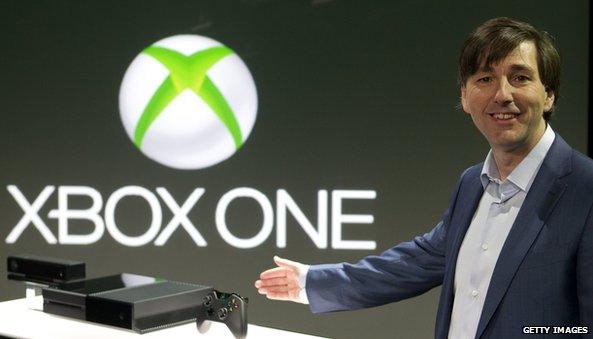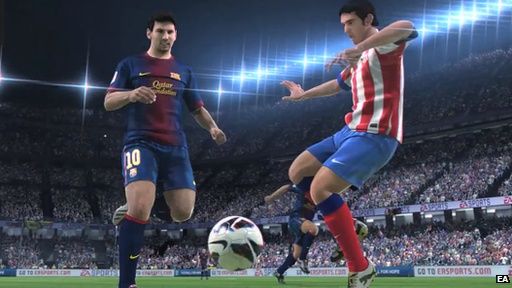Xbox One pre-owned games may require fee payment
- Published

The Xbox One, unveiled on Tuesday, will go on sale before the end of the year
Microsoft faces a backlash from some gamers after it emerged the company may charge a fee to play pre-owned games on its new Xbox One console.
It would also mean borrowing a game from a friend will require a payment to play, possibly the full price.
Microsoft has said gamers will be able to trade their used games online - but refused to give more details.
Microsoft's director of programming, Larry Hryb, admitted there had been some "confusion" around the policy.
An official Xbox support account on Twitter had initially told fans that no fee would be needed for used games, but a later comment from Mr Hryb sought to clarify the situation.
He wrote on his blog, external: "While there have been many potential scenarios discussed, today we have only confirmed that we designed Xbox One to enable our customers to trade in and resell games at retail.
Microsoft's Don Mattrick talks about the Xbox One
"Beyond that, we have not confirmed any specific scenarios."
He added that gamers could bring their games to a friends' house to play without paying a fee - but only if the game's owner is signed in to the Xbox Live account with which it is registered.
If the player wanted to lend the game to that friend, a fee would be required in order to play the title on a different Xbox Live profile.
The company advises against the sharing of Xbox Live account details with other people, and only one gamer can be signed in on a single profile at any one time.
Massively profitable
Speaking to games news website Kotaku, Microsoft's corporate vice president, Phil Harrison, said the company would soon announce further plans for pre-owned games.
"We will have a solution - we're not talking about it today - for you to be able to trade your previously played games online," he said.
The move will mean Microsoft is able to gain control of what is a massively profitable market in pre-owned games across the world.
Possible models for Microsoft could include allowing gamers to relinquish their ownership of a game in order to receive discounts on new titles bought through the Xbox Live store.
This may prove popular with sports games that have yearly updates, with fans often trading in the old version to get money off the latest edition - a process that traditionally required a physical retailer that would pocket any profits on re-sales.
"This is mainly a question of control," said Ed Barton, director of digital media at research firm Strategy Analytics.
"The margin on second-hand games is enormous, and the games industry has always been a little bit annoyed that it's a few retailers that dominate the market for games."
The move could have a damaging effect on shops who rely on pre-owned sales not only to turn profit in their own right, but to also spur sales of new titles.
"The retailers could quite fairly say that around 70% of the value of pre-owned games is subsequently spent on new games," Mr Barton added.
"There's a fair point that the trade-in business is pretty significant in driving new games sales. It remains to be seen whether that process will still continue."
One research company said UK retailers would likely take a hit if pre-owned sales drop.
"Pre-owned games made up 15% of High Street game sales in the past 24 weeks, and if they are totally blocked from the Xbox One we are likely to see High Street game sales revenue drop by 4% in the long term," said Fiona Keenan from Kantar Worldpanel.
"Relatively cheap pre-owned games have helped High Street stores retain customers where they might have otherwise shifted their spending online."
Sony's move
Sony, which will show off the PlayStation 4 at next month's E3 event in Los Angeles, has remained fairly tight-lipped on their plans for dealing with pre-owned games.
Its worldwide studios president, Shuhei Yoshida, told news site Eurogamer used games would not be "blocked" on the console, but would not specify whether there would be a fee for using pre-owned titles.
Mr Barton said Sony could use the situation to gain a considerable competitive advantage over its rival.

Sports titles, such as EA's Fifa series, are often traded in when yearly updates are released
"If Sony doesn't follow suit, I think for a reasonable proportion of the gaming market, this will be a big plus for the PlayStation console."
Also keeping a close eye on the pre-owned debate will be games developers and publishers, who may be able to boost their earnings through Microsoft's plans.
But Richard Wilson, chief executive of UK games industry trade association Tiga, said that the debate was almost irrelevant.
He argued that eventually all games sales will be purely digital, rather than bought via physical media.
"So many consumers are playing digitally, the question of lending a game to your mate is not really an issue," he told the BBC.
"More important for many developers are what Microsoft's plans are for independent developers, at E3."
E3, the largest trade event in the video games calendar, takes place in Los Angeles next month.
Follow Dave Lee on Twitter @DaveLeeBBC, external
- Published22 May 2013
- Published21 May 2013
- Published22 May 2013